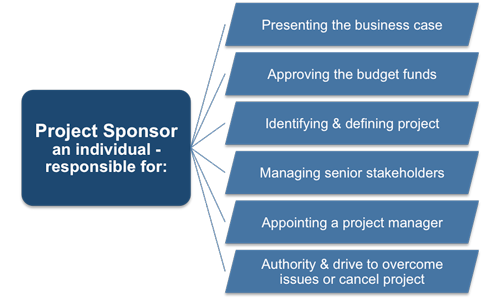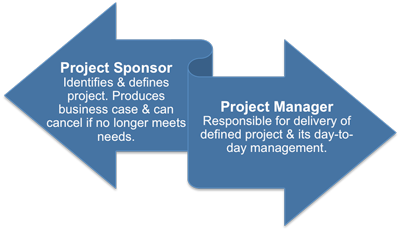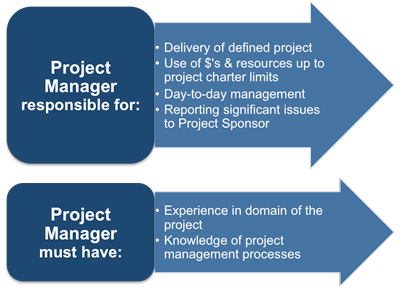Project Sponsor and Project Manager Definitions
The sponsor is responsible for securing the financing and overall resource budget approval and owns the opportunities and risks related to the financial outcome of the project. They may be referred to as the 'business sponsor,' 'project sponsor,' or 'executive' and are usually a senior manager with a direct interest in the business case behind the project.
Even though this implies that the project sponsor can be a group of people, it is usually far better if there is one named individual who has been given this role. An effective sponsor will be someone with the authority and personal drive to overcome major obstacles to completing the project.
 |
The sponsor does not concern himself or herself with the day-to-day running of the project (that is the responsibility of the project manager), but represents the 'buyer' of the project on behalf of the organization. It can be helpful to think about this in terms of the project manager working for the sponsor who is in turn working for the organization.
The project sponsor may be either internal or external to the organization that will be undertaking the project work. Many different permutations are possible - for example, an internal sponsor may commission a project that will call only on resources within the organization. Alternatively, the entire project may be outsourced to a third party.
The role of the project sponsor is to approve and fund the project, but not to get involved in day-to-day management or financial control. The project sponsor should appoint a project manager to take on the responsibility for delivering the project in accordance with its objectives.
 |
There are two main differences between project sponsorship and project management. Firstly, project sponsorship includes the identification and definition of the project, whereas project management is concerned with delivering a project that is already defined, if only quite loosely.
Secondly, the project sponsor is responsible for the project's business case and should not hesitate to recommend cancellation of the project if the business case no longer justifies the project.
It is important for every project to have a sponsor to:
• Ensure separation of decision-making responsibilities between project manager and project sponsor
• Ensure accountability for the realization of project benefits
• Ensure oversight of the project management function
• Carry out senior stakeholder management
The project manager is appointed to deliver the project as it is defined in the project charter or project plan. They have the authority to use cash and other resources up to the limit set in the project charter. If they believe at any stage that the project cannot be delivered within the assigned budget and timescale then they must notify the project sponsor so that remedial action can be taken.
 |
A project manager should have experience in the project domain and should also be familiar with the processes that make up project management.
You should now have an understanding of some of the problems involved when setting up a project that needs to run 'across' organizations, which tend to have vertical management structures. You should also be aware of some of the issues that are raised when assigning people to projects, particularly if they have continuing duties in their own department, and you can bring attention to potential issues before they arise.
Finally, with the knowledge of the specific roles and responsibilities of the project sponsor and the project manager you can ensure that others within your organization are aware of these requirements when developing a project.
The project manager should be appointed, by the project owner, to assume day-to-day management of the project. The project manager should be responsible for planning at the project and sub-project level, exercising control, ensuring product delivery and for management and motivation of staff working on the project.
Successful project management involves dealing effectively with managers and supporting personnel across departmental and functional lines, often with little or no formal authority.
The project manager should work with the project owner to appoint the sub-project managers and to define their responsibilities. Thereafter, the sub-project managers will report directly to the project manager, via regular progress reports. These progress reports represent an up-to-date summary of the status of the project and should be compiled on a regular basis, usually weekly of every two weeks.
It is the project manager's responsibility to analyze and collate the progress reports and to summarize this information in regular highlight reports which should be presented to the project owner. Highlight reports should be produced at regular intervals, for example monthly, and may also be produced in response to exceptional circumstances.
The project manager will need to maintain clear communications with other management bodies, appropriate to the size of the project. They should submit the project plans and sub-project plans to the project owner for approval and then advise the owner if there are any significant deviations from them. If tolerances are being exceeded then remedial plans may also need to be submitted for the approval of the project owner.
An important function of the project manager is to establish an appropriate environment within which the project is to operate. A number of issues need to be addressed early on to ensure that the project can proceed efficiently and effectively from the outset.
In addition to preparing the project plan, the project manager should specify or create a configuration management method for the project. Configuration management covers the tracking, documentation and issue of all project documents and products, throughout the project life cycle.
The project manager should agree the technical and quality strategy for the project, with the section that is responsible for organizational policy. It is important that the project manager also maintains clear communication with any related projects to ensure that work is neither overlooked nor duplicated.
Decisions which effect the strategic direction of a project will almost certainly need to be referred to a senior management body or individual, but it is the project manager who will have to make the recommendations and then put into effect the decisions made.
The project manager should be aware that disagreements have the potential to arise at all levels. The intensity of any particular conflict may be affected by a variety of factors including approaching deadlines, a squeeze on resources or the individual characteristics of those involved.
The issue which underlies a particular conflict may not be immediately apparent. Personality clashes are a classic underlying problem that very few people feel able to raise and discuss. It is common for personality conflicts to manifest themselves as a dispute over some project issue - for example a technical stand-off. This is where experience is invaluable, enabling the project manager to identify the real issues and then to address them effectively.
You may also be interested in:
Project Management Principles | Project Management Definition | Project Management Perspectives | Project Organization and Structure | Projects in a Matrix-Management Environment | Project Stakeholders Definition | Project Sponsor Definition | Project Life Cycle Definition | Functional Areas of Project Management.
|
|


